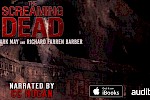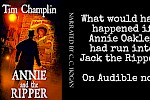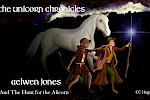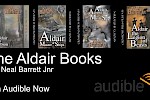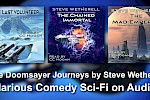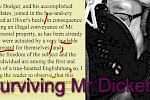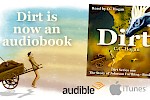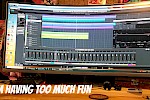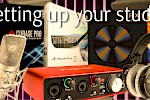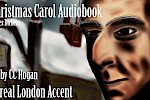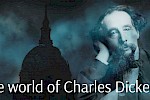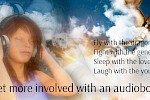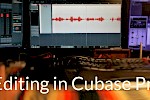Audiobooks are growing in popularity, despite them being more expensive than print or e-books, because they are easy to listen to on a smartphone that many people now own.
Audiobook Menu
FAQs:
Reading Your Book
Recording Your Book
Editing Your Recording
Technical Questions
Recording your own poetry
Other Articles:
A General Guide
Recording Dirt
Recording My Poetry
Preparing Your Manuscript
Plan your audiobook as you write
Using iZotope RX 6 with Cubase
Editing in Cubase demonstration
A bit on Punch & Roll
Should you delete breaths?
Setting up your Studio
External Articles & Resources
Punch and Roll
The market is split into several parts:
- Books recorded by famous voices produced by established production companies, sometimes with full casts and sound design
- Books recorded by professional voiceovers in some deal with an author or publishing company
- Books recorded by the author
All of these are quite legitimate and have produced a wide range of styles and, possibly, quality.
There are a lot of tutorials out there advising authors and self-producing voice overs what equipment they should buy and how they should go about recording the books. And some of these are very good.
Before changing career some years ago, I spent many years as a sound engineer/producer working on everything from music to film sound and radio drama. A huge amount of my work revolved around directing, recording and editing voiceovers.
So, I thought I would take a little time out and try to pass on some of my knowledge to those who are wandering into this field. I am not dealing with the technology here or even styles and characterisations; this is purely addressing some aspects of recording that many tutorials miss.
It Takes Time
Looking through some of the advice I have read, I was a little horrified by how quick people think the process should be. I regularly come across advice that says you should allow twice the reading time to cover editing.
So, tip number one - it should take longer than that.
Unless you are or are recording an experienced, professional voice, you will be stopping and starting frequently. Actually, in the studios, we did that even with the best of voices.
Audiobooks are normally recordings of books that were intended to be read, not said. So they include plenty of tongue twisters and complicated sentences. Even with a fully marked-up script, you may take a few runs at certain passages before you get that perfect read.
Rock n Roll
When recording, there are two methods for dealing with retakes. One is to stop, wind back, play the sentence before and drop into record at a convenient place - a comma or a period. The voice over simply picks up and carries on reading.
In the old days of tape, this was fiddly, and the engineer had to get the timing right allowing for how fast the tape travelled over the heads on the machine. We used to call this rock and roll because of rolling the tape back.
Some engineers, especially in the BBC, did not like this approach and would instruct the voice over to repeat the section and they would edit later.
The benefit of this method was that you had clean recordings of breaths to help make the edit very smooth. You could also pick a different edit point if that worked better, and have possibly a selection of takes to choose from. The downside was that the voice might not match their read that well.
With digital recording on a DAW (Digital Audio Workstation), you get the best of both worlds. You can wind back and drop in, but the original recording still exists if you need to use it.
However, dropping in like this takes a lot of practice, especially for inexperienced voiceovers. It might seem easy to match to yourself, but it can be quite difficult.
There are two tips here that might help you.
Firstly, go back to a really clear gap like at a period. If you are reading properly, you will be leaving quite long gaps, so the timing is not as critical and you will feel less pressure and be more relaxed.
Secondly, try reading along with yourself. Singers often do this to make sure they are getting the levels and tone right, so it makes sense for a voiceover to do likewise. Even professionals do this if they are dropping in at a strange point.
How fast should I read?
This is a harder one. Generally, the advice is to read much slower than you think, but you run the risk of sounding wooden. I have listened to several recordings now that are so mechanical in the read that they could almost be a bot - but they aren't!
The reality is a lot more complicated; your speed should be variable.
Part of this is about how you deal with emphasis. There is a common misconception that you emphasise a word by saying it louder. But the best way to emphasise a word or phrase is to say it slower.
But if you are reading very slowly in the first place, then slowing down yet further for emphasis could be tortuous. The trick is to read parts which are less important a little quicker and slow down on the parts that need to be highlighted. This also can give a sense of gravitas to the read, especially if you slow down at the end ... of ... sentences!
Spacing is also worth paying attention to. How much gap you leave between paragraphs, sentences and phrases can change the mood and help keep the story clear, even when some of the read is quite fast.
As with the overall read speed, you will probably want to leave longer gaps than is natural, but in the context of a nicely paced read, they will be fine.
Tip: If in doubt, leave long gaps. It is very easy to shorten a gap in the edit, but more difficult to increase a gap. If you are unsure of perfect spacing, overdo it and sort it out at the edit.
Breaths
Breaths in a recording are quite natural and perfectly legitimate. The idea that they all should be edited out somehow is bollocks. I have heard several excerpts where most of the breaths have been removed, and again it just sounds like a robot.
Breaths not only prove you are human, but they carry an enormous amount of emotion, so they are important. However, they need to be handled in the same way as the rest of the text.
I will deal more with breaths in the editing section below, but here are a few tips.
If you are someone who takes a breath hard on the end of every sentence, get out of that habit now. I know many singers do this as it can sound more emotional, but they end up doing it all the time. It is terrible to deal with in editing if you want to remove them later and often unsatisfactory.
Try not to take snatched breaths but find good places in your text to pause and breathe properly. Again, like spacing, it is better to overdo this if you are uncertain.
In an ideal world, markup where to breathe on the script - our pro voices always did this and it both sped up the recording session and improved the read. Many of them used a slash across the line to show where to breathe as it was nice and clear.
Think about who is speaking. Breaths on characters are good, but you may want to have less obvious breaths on the narrator unless they are conveying emotion.
If you are using breaths to help with the mood of the section, put as much acting into the breaths as you do into the words. It will be more powerful and easier to edit.
Sometimes you will do the wrong breath - for instance, an uncertain sounding breath immediately before a positive sentence. Or a powerful breath before a whisper. Where you hear a breath, it should match the speech.
If you have a long sentence that needs to be read "in one" without pauses, take a long breath, hold it for a count of three, then read. You can edit the gap out later. By doing this you will be able to control how fast you use the air better and are less likely to run out of breath.
How much air you have in your lungs will affect the power of a read - more air equals more power. If you have a powerful scene, you will need to take breaths more often.
Editing
And really, everything else has been building up to this.
The editing process has two aims - repair any mistakes and polish the final version.
Editing the mistakes is easy. If you have taken care of everything I have talked about above, then that part of the editing should be logical.
Polishing is more difficult but vitally important.
The edit is the time when you get to make sure all the breaths are doing what they should do and that the timing, the spacing between phrases, sentences and paragraphs is ideal.
There is no fixed formula here, and indeed, you should avoid making all the spacing identical - you will kill the read. So, much of this is down to experience and looking at the edit from a creative point of view rather than a technical point of view.
When you record, you should always make sure you get a couple of things right immediately. The most important is record levels. This is not just how much you have the mic turned up, but how far from the mic you are sitting. Once you get a position that gives you the best sound (tons of tutorials out there about this), remember it! You are not going to record your book in one go, so you need to keep consistent. I admit I am not always that brilliant at this on my own recordings, though I am scrupulous when working for someone else.
The other thing is to make sure you record some buzz track. Sorry, I notice that people seem to call it "room tone" these days. We always called it buzz track, probably because of all those big, buzzing machines we had back then! Basically, this is a short recording with the mic open and the room set exactly as it is when you record. You only need ten seconds, but it will save your life in editing.
Right, let's break this down.
Repairing
There are lots of problems you might need to sort out. Some are possible, some are not and you will need to re-record a section. So, if you are employing a voice, get it right before they go home!
Here are things that really are difficult or impossible to sort out in the edit:
- Pops - this is a blast of air on the mic. They are not always caused by the letter P, but also B and Qu - like Quite. Sometimes you can filter it out, but they are such a pain to deal with, get it right in the record.
- Whistles. This is whistles through the teeth with words like shoot. Impossible to deal with.
- Breaths welded on the ends of words. If you want them, fine, but if you change your mind, they are very difficult to lose. Again, get it right in the record.
- Furniture or other noises under words. If the neighbour starts shifting his skip between words, you can edit it out, but if it is under a word (and it probably will be) then you are buggered. In film, the most common reason for re-recording dialogue after the shoot (called ADR) is because the set had noisy props!
- Wet mouth. Clicks and some wetness can be edited out, but there is always the few that can't. Don't spend hours struggling, just re-record the line.
Once you have sorted that lot out, other repairs are more possible. For instance, breaths can be replaced with a bit of your buzz track. But sometimes it is better to keep the breath, unless it is ugly, and just lower the level. It feels more natural but is less intrusive. I used to do this a lot when editing.
I also sometimes make up a little library of breaths stolen from the recording. Then, if I do need to replace one rather than eliminate it, I have a couple I can use. If you have more than one voice, make sure you use the right breath for the right person!
The other repair you might need to make is levels. However much you try, occasionally something will be too loud or too quite. Don't be afraid to sort it out, but when you do, play back a good couple of sentences before the edit to make sure you have the right level. Very easy to get this one wrong. Also, if the recording is too quiet, when you bring up the level, you will bring up the room ambience too. That might be a problem.
Creative Editing
The creative side of editing a voice is all about timing. I like to keep a visual in my head of a scene. When two people talk, a duologue, the transitions from one voice to the other will vary. Sometimes there will be big pauses, sometimes they will speak over each other.
When you are recording dialogue with only one voice, an overlap would be odd, but pauses are worth thinking about. If the gaps between the speeches are all the same it will become very dull, very quickly. If a section is quite emotional, you might want to convey the idea that someone is thinking before speaking. For instance, in the book I am recording at the moment I have this little passage:
"What about your father?"
"Dead."
Farthing was at a loss what to do or say...
When I edited it, I put long pauses between the three lines and a surprising lack of emotion in the actual read. The pauses did all the work; I didn't need for the words to be dramatic too. The same rules apply to comedy, and really, this is probably more about comedy timing than anything else. You can use comedy timing in drama just as well.
To a greater extent, you will take care of this in the recording, but some trimming or extending is justified in the edit.
For instance, in the above, I had breathed before the word "Dead." But there wasn't much of a breath before "Farthing." I removed the breath before "dead" entirely and made sure there was a nice long breath before "Farthing," even though this is the narrator. But having messed with the breaths, the timing was now wrong and I needed to change the length of the pauses. Try it yourself by recording that small passage and you will see what I mean.
I spend a lot of time messing with spaces and breaths because I think it can bring it all to life. When I used to record professional voices, I would direct them in the record, telling them to leave bigger pauses if necessary or add a nice emotional breath, but if you are recording yourself, that is harder and it may need to wait for the edit for you to be a bit more detached and get it right. Nothing wrong with that.
If you are the voiceover too, don't be afraid to re-record a section if you think you can do it better. Sometimes, turning on the mic is a lot quicker than editing.
Other Tips
There are a few other things that we used to do that may be useful for you.
Don't spend hours recording. When you record very long scripts it is inevitable that the front of the read will have more energy than the end. So, I used to break the recording up into sections of just a few pages. Actually, the more experienced voiceovers would ask to do this anyway.
Since back then we were always using paper scripts, this meant they had less script to deal with and they could take a few moments to restore their energy and sort out the paperwork before pressing on. It can make a huge difference to the recording.
I was terminally fussy. You probably noticed that the list of problems you can't sort out in the edit is longer than those you can. So, be very careful of letting things pass. If it doesn't feel just right, do it again.
Tongue twisters are a nightmare, and you would be amazed what can trip you up. "Had had" is a problem, for instance. The trick is to emphasise the second "had" and to make sure that you don't swallow the first one. But it still gets me most times! Words like "little" get me - instant wet mouth. Oh, and the word "it" when it follows something that sounds similar like "he edited it." Damn, still can't say that.
With any words or sentences that are hard to navigate, pause, take a breath and break them up. There is a good chance the problem is that you are trying to read them too fast or not putting in the right pauses.
Remember this is acting, not a corporate script. Even the narrator is a character if you think about it.
Keep references. I have a recording of the opening of a chapter and a couple of characters. If I feel like I am wandering, I stop and play these back.
If you are reading off a tablet, mess with the font size. For reading out loud, you may well want it bigger than normal, but if it is too big, the sentences will start to look odd and you will lose the sense.
And lastly, back to where we started, take your time. Unlike making a documentary or a commercial, there is no fixed running time for an audiobook. Find the right pace by recording and playing back till you are happy, then use that as your metre.
Oh, and enjoy it. This is a performance at the end of the day and people are paying to be entertained. So, be fussy, be careful, but be entertaining!












